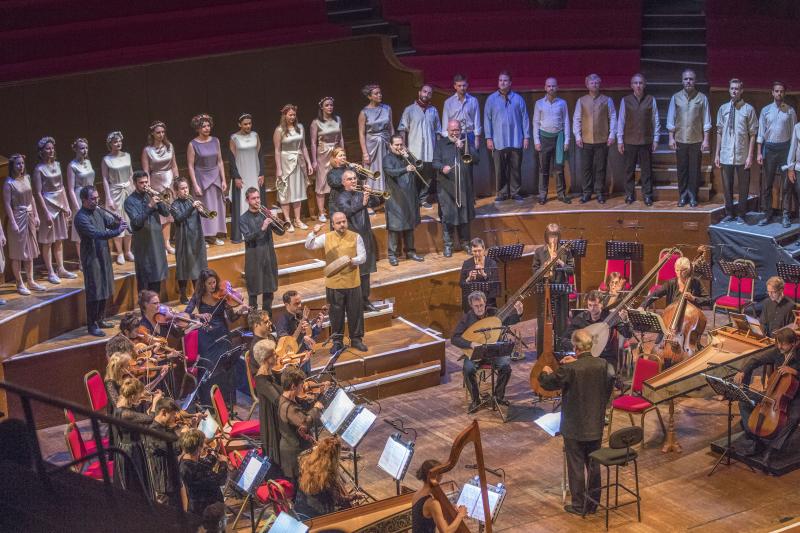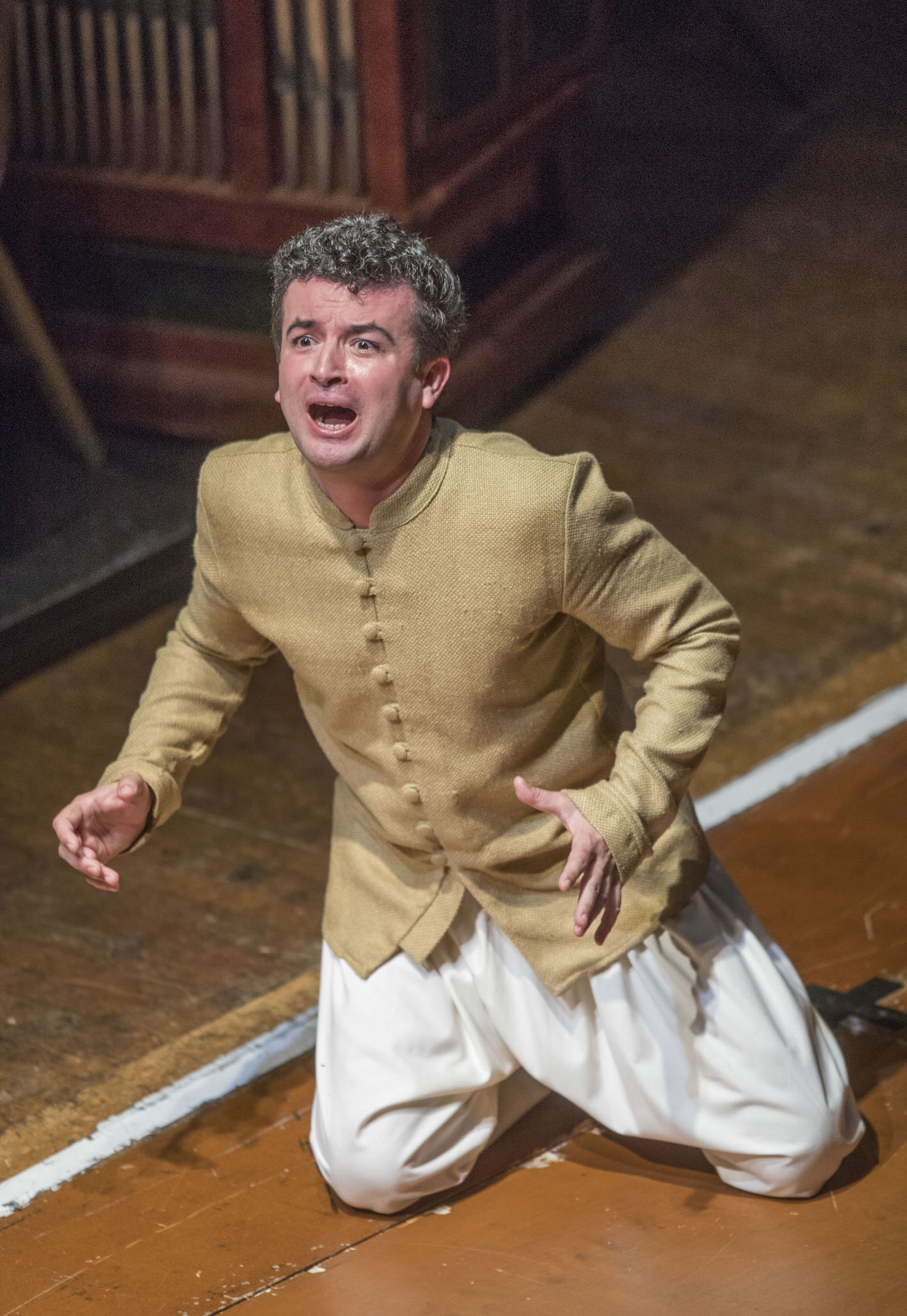L'Orfeo, EBS, Gardiner, Colston Hall, Bristol | reviews, news & interviews
L'Orfeo, EBS, Gardiner, Colston Hall, Bristol
L'Orfeo, EBS, Gardiner, Colston Hall, Bristol
Gardiner's Monteverdi ends at the beginning and is none the worse for that

This last of Sir John Eliot Gardiner’s semi-staged Monteverdi series took us back practically to the very start of the whole genre. L’Orfeo was presented in Mantua in 1607 as a court opera, and will have been seen and heard by a fraction of the number of people who crowded into Bristol’s Colston Hall on Sunda
Anyone who has come across the madrigal group I Fagiolini’s Full Monteverdi performances will have an idea of how L’Orfeo emerged from the madrigals of Monteverdi’s just-previous fourth and fifth books. I Fagiolini sing the madrigals to brilliant effect in dramatised settings, seated perhaps as customers in a restaurant, suddenly breaking into passionate conversation, declarations of love, recriminations, abuse. L’Orfeo is very like that, only arranged around an actual story – the archetypal story of early opera. And suddenly you have the first masterpiece of the lyric stage, a hybrid maybe, but one of such immaculate theatrical judgement that the transition seems the most natural process in the world.
 The first act, an extended celebration of Orpheus’s love for Eurydice, is in one sense no more than a string of pearls: the usual allegorical boasting by some minor deity – here the Spirit of Music, nicely sung by Hana Blažíková, accompanying herself on the harp; then a brilliant sequence of choruses, dances and orchestral ritornelli, framing one grand formal aria, Orpheus’s “Rosa del ciel”. In another sense, though, it’s a quasi Puccinian set-up, softening us up for the announcement of Eurydice’s death by snake-bite at the start of Act 2 and Orpheus’s dramatic confrontation with Charon as he tries to cross the Styx to retrieve his bride.
The first act, an extended celebration of Orpheus’s love for Eurydice, is in one sense no more than a string of pearls: the usual allegorical boasting by some minor deity – here the Spirit of Music, nicely sung by Hana Blažíková, accompanying herself on the harp; then a brilliant sequence of choruses, dances and orchestral ritornelli, framing one grand formal aria, Orpheus’s “Rosa del ciel”. In another sense, though, it’s a quasi Puccinian set-up, softening us up for the announcement of Eurydice’s death by snake-bite at the start of Act 2 and Orpheus’s dramatic confrontation with Charon as he tries to cross the Styx to retrieve his bride.
The drama is rather ceremonious, statuesque even, but none the less moving for that. For my money, Orpheus’s “Possente spirito” is one of the greatest tenor arias in the entire repertoire, and Krystian Adam (pictured above) despatched it with tremendous panache, brilliantly accompanied by the violins and assorted brass of the English Baroque Soloists. No wonder Charon, the sombre-voiced Gianluca Buratto, succumbed, if only by the self-exculpating device of falling asleep. On the return journey, Orpheus’s failure is due, not – as in Gluck – to Eurydice’s pleadings, but to his own doubts. His turning round was startling and perfectly timed, and drew a gasp from the Colston Hall audience. Then finally his long lament, and the inevitable deus ex machina with sackbuts (trombones).
A better presentation of this beautiful, serene masterpiece would be hard to imagine. The music’s madrigalian character means a lot of work for the chorus, and here the Monteverdi Choir were in their element, singing, dancing and acting with verve, precision but evident enjoyment. As with the two later operas, Elsa Rooke manoeuvred everyone around the limited and somewhat perilous space with great skill and without mishap, the whole thing discreetly costumed by Patricia Hofstede, a peasant smock here, a satin party frock there, black of course for Hades, but in general just a faint touch of the come-as-you-are (but clean and tidy).
The playing, a colourful mix of instruments known to have been used in 1607 (there is no full score), was incomparably eloquent and stylish, and the solo singing generally spot on. Blažíková’s Eurydice (one of several doublings) had faint memories of her Poppea, a shade too much arm, but musically fresh and personable, and it was nice to see her in the final act ensembles: no prima donna she but a versatile team-player. For the rest, there were no weak links but too many strong ones to list. Anna Dennis was excellent, for the third time of asking, as Speranza, the Hope that is abandoned entering Hades; Lucile Richardot handled superbly her long, slow entrance as the bearer of ill tidings. But in the end it was Adam and Buratto who mattered, the first great operatic confrontation; and Gardiner, the ultimate master of ceremonies.
Add comment
The future of Arts Journalism
You can stop theartsdesk.com closing!
We urgently need financing to survive. Our fundraising drive has thus far raised £49,000 but we need to reach £100,000 or we will be forced to close. Please contribute here: https://gofund.me/c3f6033d
And if you can forward this information to anyone who might assist, we’d be grateful.

Subscribe to theartsdesk.com
Thank you for continuing to read our work on theartsdesk.com. For unlimited access to every article in its entirety, including our archive of more than 15,000 pieces, we're asking for £5 per month or £40 per year. We feel it's a very good deal, and hope you do too.
To take a subscription now simply click here.
And if you're looking for that extra gift for a friend or family member, why not treat them to a theartsdesk.com gift subscription?
more Opera
 BBC Proms: The Marriage of Figaro, Glyndebourne Festival review - merriment and menace
Strong Proms transfer for a robust and affecting show
BBC Proms: The Marriage of Figaro, Glyndebourne Festival review - merriment and menace
Strong Proms transfer for a robust and affecting show
 BBC Proms: Suor Angelica, LSO, Pappano review - earthly passion, heavenly grief
A Sister to remember blesses Puccini's convent tragedy
BBC Proms: Suor Angelica, LSO, Pappano review - earthly passion, heavenly grief
A Sister to remember blesses Puccini's convent tragedy
 Orpheus and Eurydice, Opera Queensland/SCO, Edinburgh International Festival 2025 review - dazzling, but distracting
Eye-popping acrobatics don’t always assist in Gluck’s quest for operatic truth
Orpheus and Eurydice, Opera Queensland/SCO, Edinburgh International Festival 2025 review - dazzling, but distracting
Eye-popping acrobatics don’t always assist in Gluck’s quest for operatic truth
 MARS, Irish National Opera review - silly space oddity with fun stretches
Cast, orchestra and production give Jennifer Walshe’s bold collage their all
MARS, Irish National Opera review - silly space oddity with fun stretches
Cast, orchestra and production give Jennifer Walshe’s bold collage their all
 Káťa Kabanová, Glyndebourne review - emotional concentration in a salle modulable
Janáček superbly done through or in spite of the symbolism
Káťa Kabanová, Glyndebourne review - emotional concentration in a salle modulable
Janáček superbly done through or in spite of the symbolism
 Buxton International Festival 2025 review - a lavish offering of smaller-scale work
Allison Cook stands out in a fascinating integrated double bill of Bernstein and Poulenc
Buxton International Festival 2025 review - a lavish offering of smaller-scale work
Allison Cook stands out in a fascinating integrated double bill of Bernstein and Poulenc
 Tosca, Clonter Opera review - beauty and integrity in miniature
Happy surprises and a convincing interpretation of Puccini for today
Tosca, Clonter Opera review - beauty and integrity in miniature
Happy surprises and a convincing interpretation of Puccini for today
 Hamlet, Buxton International Festival review - how to re-imagine re-imagined Shakespeare
Music comes first in very 19th century, very Romantic, very French operatic creation
Hamlet, Buxton International Festival review - how to re-imagine re-imagined Shakespeare
Music comes first in very 19th century, very Romantic, very French operatic creation
 Falstaff, Glyndebourne review - knockabout and nostalgia in postwar Windsor
A fat knight to remember, and snappy stagecraft, overcome some tedious waits
Falstaff, Glyndebourne review - knockabout and nostalgia in postwar Windsor
A fat knight to remember, and snappy stagecraft, overcome some tedious waits
 Salome, LSO, Pappano, Barbican review - a partnership in a million
Asmik Grigorian is vocal perfection in league with a great conductor and orchestra
Salome, LSO, Pappano, Barbican review - a partnership in a million
Asmik Grigorian is vocal perfection in league with a great conductor and orchestra
 Semele, Royal Opera review - unholy smoke
Style comes and goes in a justifiably dark treatment of Handelian myth
Semele, Royal Opera review - unholy smoke
Style comes and goes in a justifiably dark treatment of Handelian myth
 Le nozze di Figaro, Glyndebourne review - perceptive humanity in period setting
Mostly glorious cast, sharp ideas, fussy conducting
Le nozze di Figaro, Glyndebourne review - perceptive humanity in period setting
Mostly glorious cast, sharp ideas, fussy conducting

Comments
An excellent review, and one